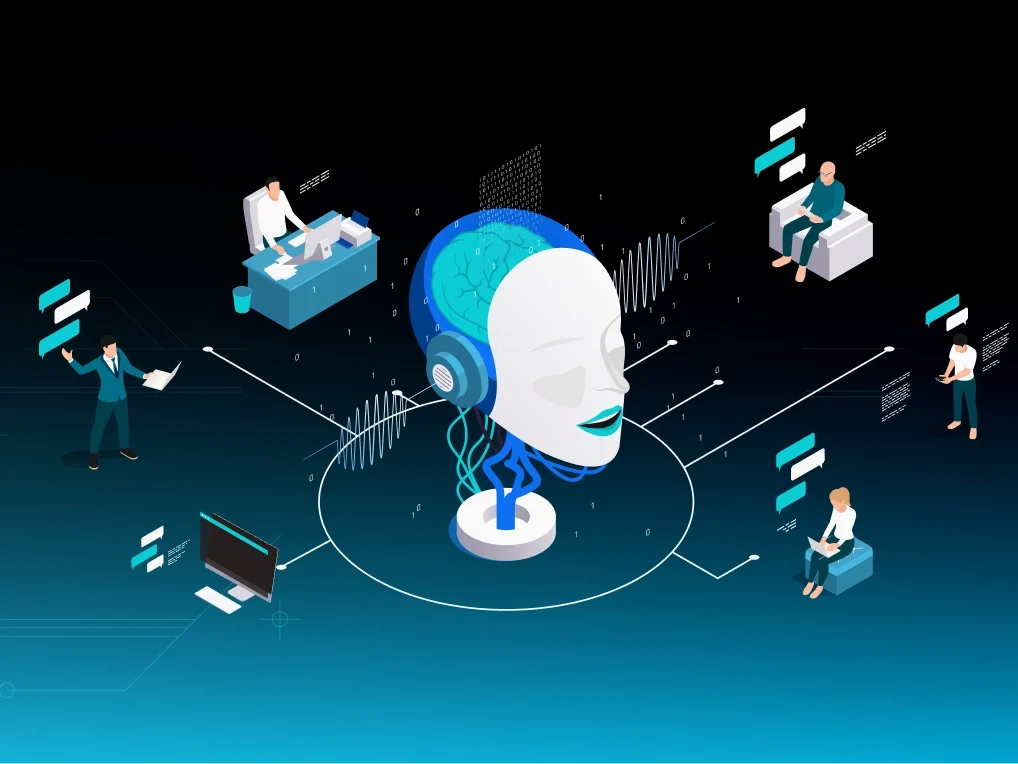If you plan to increase the productivity of your commercial group, you need to think about implementing artificial intelligence (AI). According to data published in the State of Sales review, only 37% of companies utilize AI for sales today, and more than 50% of high-performing enterprises have successfully introduced AI-backed techniques.
It does not mean automating all business activities. Modern tools save professionals time so they can concentrate on selling. Let’s talk about AI’s profits to your firm and how to use AI for sales.
The Definition of AI in Sales and Its Importance
Artificial intelligence for sales involves adding advanced mechanisms and analytics instruments to enhance business operations. By automating routine procedures and studying customer insights, AI helps commercial departments function more efficiently and close more trades. Additionally, machine learning platforms can be utilized to predict transactions and customer actions and generate valuable data.
A recent Salesforce research demonstrated AI is one of the primary business tools whose value has increased dramatically in 2023 compared to 2019. Forrester also expects the AI-backed instruments industry will reach $37 billion by 2025. The popularity of modern systems is associated with a long list of their benefits, including:
- Efficiency gains: consulting organization Deloitte has found top-level enterprises evaluate efficiency as the primary profit they plan to gain from adding AI. More than 30% of sales departments utilizing AI believe such instruments have made commercial procedures more cost-effective.
- Simplify labor-intensive procedures: McKinsey research demonstrates approximately 30% of sales-related objectives can be automated with modern business technologies, including AI.
- Exact planning and forecasting: about half of sellers consider forecasts the most valuable data they may obtain with commercial instruments. AI sales automation can perfect planning procedures, e.g., AI sales analytics and predictive intelligence.
AI also perfects the morale of your employees. In 2022, Delloite surveyed, according to which 82% of interviewees believed methods based on artificial intelligence would increase their efficiency and satisfaction with their activities.
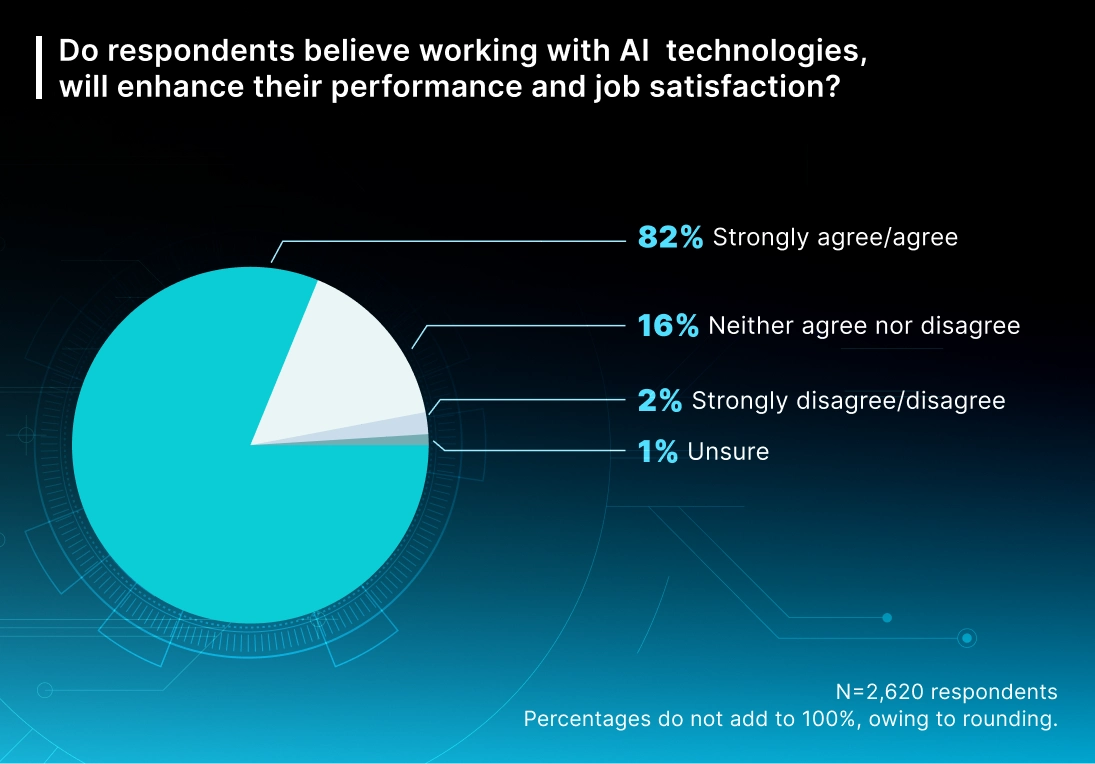
Groups of AI in Commercial Operations
Diverse categories of information require the application of dissimilar AI-backed solutions. Let’s look at some of the most popular options sales groups utilize in various areas:
- Natural Language Processing (NLP): these instruments are utilized to comprehend human speech (spoken and written) and react to it in a human-sounding path. NLP recognizes the essence of what is said and estimates feelings and aims. Such AI-backed techniques are necessary to build digital helpers, speech-to-text software, and AI sales bot.
- AI analytics: these systems try to find patterns with your raw data. AI Analytics platforms seek inconsistencies and inform you about them in real-time, saving analysts’ working hours. You may also introduce revenue AI for sales to collect, process, and interpret commercial data to make informed decisions.
- Smart process automation (SPA) comprises robotic and machine learning (ML). The SPA determines when a live agent must intervene in the conversation to move to the following phase. It adds experts to the procedure and then examines their decisions to foretell what they might do in similar conditions.
Artificial intelligence may improve various features of commercial processes. According to Harvard Business Review, firms adopting AI into their retail operations have increased their lead base by 50%, reduced call cycle times by 60-70%, and reached a 40-60% expenditure decrease.
How to Utilize AI in Sales?
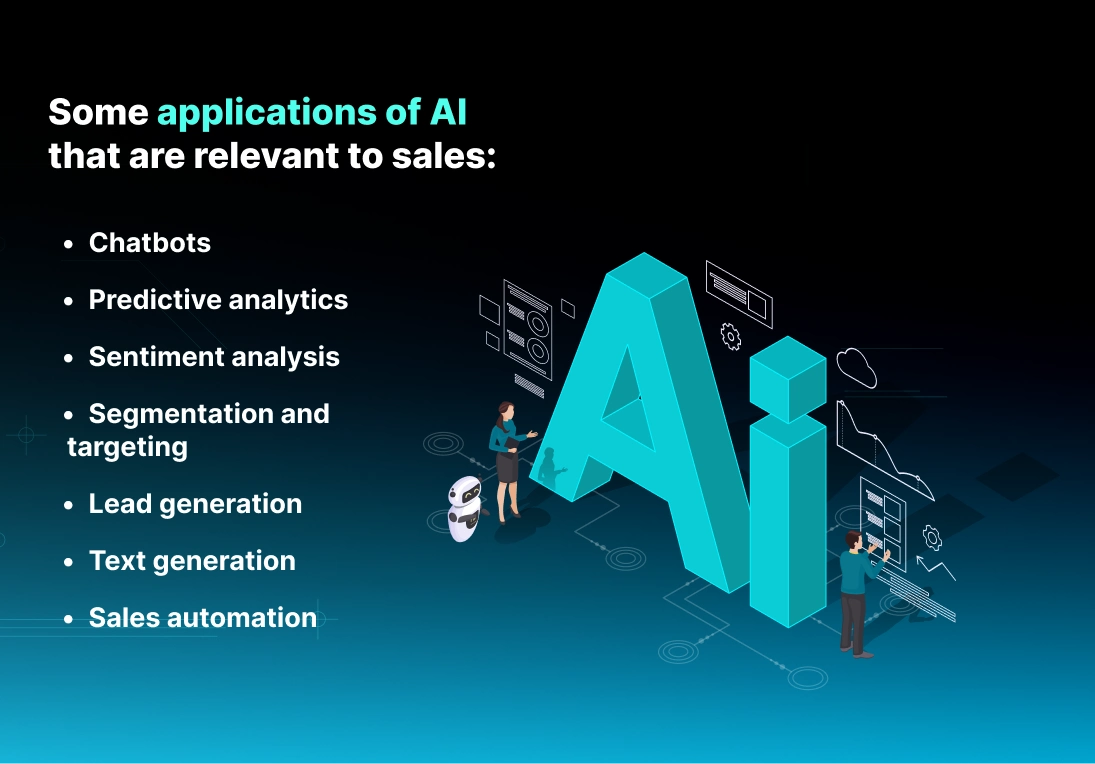
As AI-backed solutions are actively developing and becoming more accessible, they significantly impact many fields, including commercial activities.
Artificial intelligence will not wholly replace human labor in the coming years. Since the sales field is based on communicating with people, it requires advanced communication skills to build long-term customer relationships, and AI does not yet have such abilities. However, it may help sellers with specific tasks. Below, we will look at how to use AI in sales.
Sales automation
AI also helps automate many processes, freeing you from routine work that distracts you from solving more critical objectives.
AI sales assist in everything from calendar management to meeting scheduling and sales funnel analysis, automatically performing these activities or making them much more accessible by leveraging historical decision-making information.
This use case is reminiscent of various consumer calendar and productivity applications, recommending recurring events or to-do dynamically with AI-backed techniques.
AI and marketing
Marketers must inform customers about a firm’s commodities and services and create a complete content-based experience that ensures customer trust and raises brand value.
Much content matches the above activities, generating much insight to study. AI marketing allows specialists to compute the success of their campaigns by checking insights such as email open parameters and click-through indicators and then propose more effective solutions.
The creation of AI-backed digital helpers
AI sales chatbot quickly responds to customers and potential buyers; they may assist you in qualifying leads and moving them through the sales funnel. Such conversational AI for sales can answer consumer questions, collect insights about the customer base, and make product recommendations. You may prefer a basic chatbot that offers pre-programmed responses to customers or an AI sales assistant that uses advanced instruments to comprehend the information the customer is saying, generate responses, and improve communication skills over time.
Eliminating CRM data entry objectives
According to statistics, the average sales rep spends only 28% of his working hours on trading. This is mainly due to the need to perform repetitive objectives, including CRM data entry. Updating lead data, recording customer collaborations, and other activities are time-consuming.
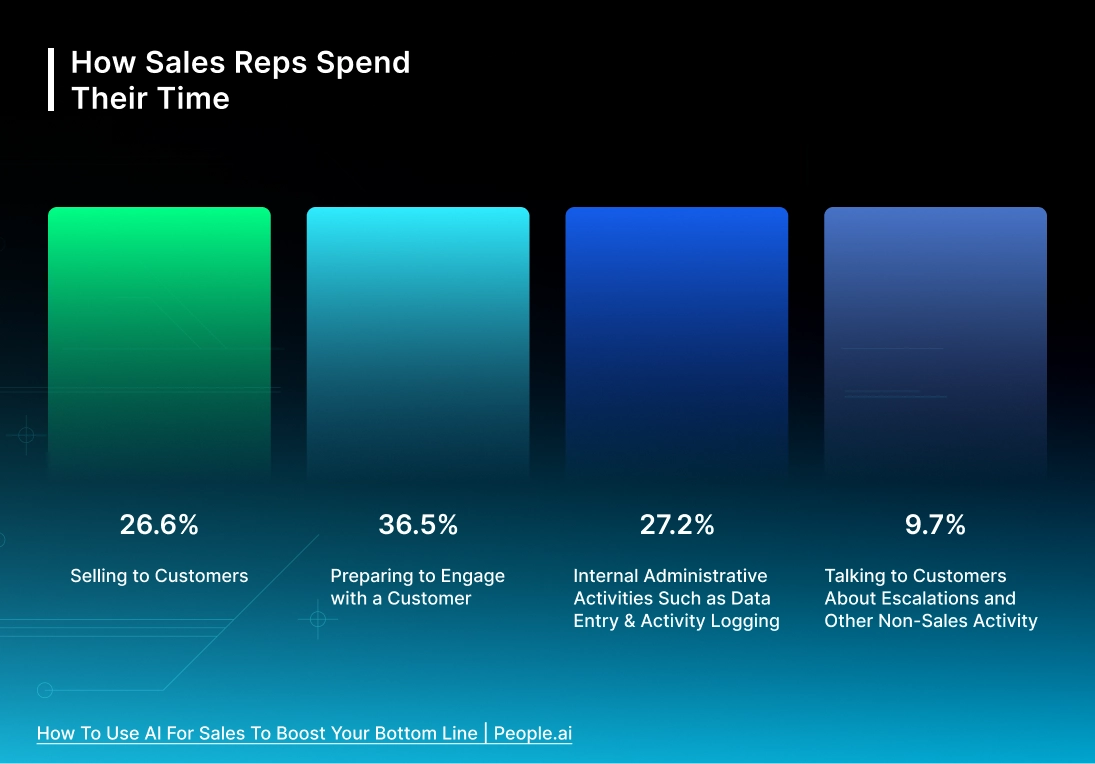
Once you invest in AI-backed systems, they will handle data entry objectives with AI sales CRM so you can concentrate on other issues, including communicating with existing customers and providing them with a perfect experience.
Commercial forecast
Some AI-backed systems may use historical information to predict future outcomes. Standard predictions AI platforms may perform include:
- Deals or prospects that have a high probability of closing.
- Deals or prospects you need to concentrate on in the future.
- New customers who may be interested in your commodities.
The reliability of the results depends on the chosen AI instruments and the quality of the database. With the correct information, AI sales prospecting becomes as effective as possible. Forecasting also helps the commercial team predict the group’s performance for the quarter in advance so that necessary actions may be taken.
Price optimization
Setting the proper price is sophisticated, but AI-backed solutions make this procedure easier. They utilize particular algorithms to examine all elements of the last operations, calculate the fair cost of each category of commodities, and inform the seller about this. Dynamic pricing structures implement machine learning mechanics to collect insights about the activities of competitors. They may generate advice based on this data and shoppers’ individual preferences.
Sentiment analysis
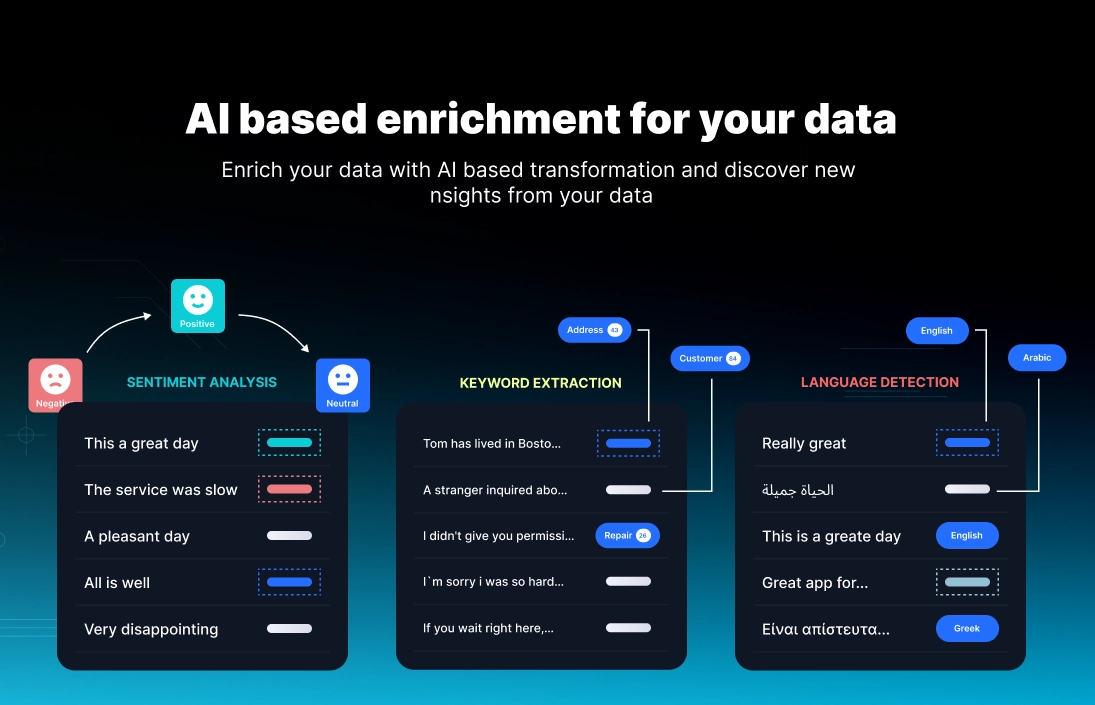
Conversation research, real-time tracking, and transcription of sales discussions are other promising branches to apply AI for sales. Utilizing NLP and ML instruments, such software monitors the conversation. It explores the choice of sentences, emotions, and other indicators to define the customer’s mood and changes in his purchasing plans as the conversation progresses.
Imagine communicating with buyers with constant real-time sentiment assessment and pop-up advice for when the customer is ready to purchase or what documents to show the customer if they are skeptical.
Text generation
Generative AI systems allow entrepreneurs to create email texts, presentations, and advertising materials. Such tools can generate drafts of texts or provide the necessary data. We do not recommend relying entirely on AI-backed tools, as they may produce inaccurate data, and content created solely with AI is not ready for use with a broader audience.
Sales training
Do your employees comprehend how to collaborate with cold leads? What about the situation when a potential client disagrees with the pricing policy of your enterprise? Does the commercial department realize how to upsell and cross-sell?
If you are a sales manager, you aim to teach your workers to be successful, meaning they should be prepared for any of the above scenarios. Artificial intelligence perfects the educational process in several paths. First, record calls and collect vital insights. You can then analyze this data and provide employees with valuable recommendations.
Secondly, you may choose AI-riled solutions that contain coaching features. Such cutting-edge platforms use cutting-edge tools to help your employees take the right actions at the optimal moment.
Critical Challenges of AI in Commercial Activity
As you comprehend, AI can significantly benefit your business, but it is not a panacea. There are some challenges and limitations to be aware of, including the following challenges:
- Balancing AI and human communication: if a firm places too much emphasis on artificial intelligence and neglects the human component, today’s tools will be underperforming, especially in industries such as long-term relationship building.
- Problems with accuracy of results: AI-backed solutions can sometimes provide inaccurate answers and estimations or may not be consistent with your business tactics. It is necessary to test the correctness of AI for sales results before starting its active use.
Don’t forget about the financial component. Although AI-backed systems are becoming more accessible, they still require significant expenditures. Commercial teams must balance the costs, hours, and energy to adopt AI-ruled techniques with all their benefits.
Recommendations on How to Create Commercial Tactics with AI
If you plan to introduce AI in sales, you can begin with several simple steps. Regardless of what kind of instruments you prefer, you need to comprehend what you plan to achieve:
- Define challenges: Before implementing AI-backed solutions, you must know what you want to accomplish and define zones where such solutions can create maximum value. Don’t expect quick results; be realistic about the tasks while employees learn the technique. Ensure they remember they can ask questions.
- Select the proper AI sales tools: One of the most critical phases in adopting artificial intelligence is finding the optimal instruments. Spend enough time researching your options and selecting platforms corresponding to your standards and budget.
- Ensure data quality: you need quality information if you want reliable results. It is helpful to provide AI-backed systems with data about your enterprise so that the result considers the specifics of your activity. Guarantee high data quality by using reliable CRMs and managing them according to best practices.
To obtain maximum profit from AI, your employees must understand why and how to utilize such instruments. Invest time in training to ensure all employees are on the same page and comprehend how to implement modern solutions effectively.
Final Words
Whether we speak about B2B or B2C operations, personal meetings, or inside sales, the landscape of the commerce area is changing dramatically with the addition of artificial intelligence in sales.
Automation of routine procedures and reduction of commercial cycles make it possible to decrease the time required to carry out repetitive operations and upgrade algorithms that involve the participation of proficient, e.g., making decisions about how to manage objections during phone conversations with potential clients.
With MetaDialog, you can transform your sales operation into a data-driven, efficient, and customer-centric powerhouse, staying ahead of the competition and achieving sales success like never before. Book a demo to see firsthand how our solution will work based on your data. Embrace AI with MetaDialog and unlock the full potential of your business.
